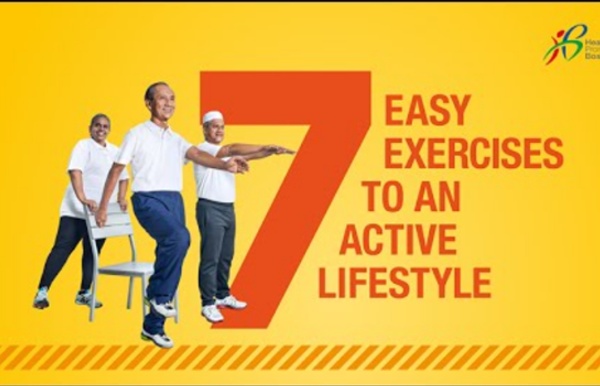



http://www.youtube.com/watch?v=4UCkKDlXYk4
Related: Maintaining cognitive abilities - Staying active (Older adults) • The effects of social isolation in elderlyDementia - WHO Dementia is a syndrome – usually of a chronic or progressive nature – in which there is deterioration in cognitive function (i.e. the ability to process thought) beyond what might be expected from normal ageing. It affects memory, thinking, orientation, comprehension, calculation, learning capacity, language, and judgement. Consciousness is not affected. The impairment in cognitive function is commonly accompanied, and occasionally preceded, by deterioration in emotional control, social behaviour, or motivation.
Call these helplines if you need emotional or psychological support As we do our part to practise safe-distancing to protect the health of ourselves and those around us, paying attention to our mental and emotional well-being is equally important as well. Connect with family or friends Staying connected with family and friends through phone or video calls can do a lot for your mental health. Use these virtual meet-ups to also check on your loved ones to make sure they are staying safe and coping well.
The Best Brain Games for Seniors By Donna McHugh, Regional Director, Community Partnerships on Jan 2, 2019 11:55:56 AM As you age, you may find yourself or someone you love becoming a bit more forgetful, or maybe you keep misplacing things. While frequent forgetfulness or severe memory loss may be a sign of Alzheimer’s disease, some forgetfulness is a normal part of aging. While it’s not preventable, there are things you can do to slow down the brain aging process. Keeping your brain active, much like your body, is very important at all times of life.
Healthy Eating with Ah Ma and Ah Gong A balanced diet and healthy eating habits are important to healthy ageing. Get Ah Ma and Ah Gong to eat healthy meals! Besides staying active, a balanced diet with wholesome, healthy food is key to healthy ageing. Here are some tips that you can share with your grandparents — or even parents — so they can get their optimum nutrition to stay healthier for longer. 1. When should I be worried about my cognitive abilities decline? Refer to the table in this webpage to have a brief guide on what are some of the normal age-related cognitive abilities decline Scientists used to think that brain connections developed at a rapid pace in the first few years of life, until you reached your mental peak in your early 20s. Your cognitive abilities would level off at around middle age, and then start to gradually decline. We now know this is not true. Instead, scientists now see the brain as continuously changing and developing across the entire life span.
COVID-19 Resources for Older People - NUH This guide has been developed to support older people during the COVID-19 circuit breaker and beyond. While staying at home is essential to break the chain of transmission, it can also be a challenging time for older adults and their caregivers. It is essential that older adults continue to stay engaged and healthy, both physically and mentally. This list features free resources for older adults to keep active, even while at home. Together, we will get through this!
Staying active through different ways! There are many things you can do to help yourself age well: exercise and be physically active, make healthy food choices, and don’t smoke. But did you know that participating in activities you enjoy may also help support healthy aging? As people get older, they often find themselves spending more and more time at home alone. The isolation can lead to depression and is not good for your health. Smart, Assistive Technology for the Elderly and Caregivers In Singapore, the number of senior citizens aged 65 and above is expected to reach 900,000 by 2030. Coupled with rising chronic illness demands and the nation’s low birth rate, it is important that seniors are provided with the support they need for healthy ageing. Here is where cutting edge technology plays a part.
Cognitive Health and Older Adults Cognitive health—the ability to clearly think, learn, and remember—is an important component of brain health. Others include: Motor function—how well you make and control movements Emotional function—how well you interpret and respond to emotions Sensory function—how well you feel and respond to sensations of touch, including pressure, pain, and temperature This guide focuses on cognitive health and what you can do to help maintain it. 6 Best Cognitive Games and Activities for Seniors Has a senior loved one struggled to recall the name of an old friend or remember the street that their first house was located on? Little facts like these can be a challenge for seniors to remember as they get older. If someone you love faces memory challenges, don’t worry. Physical Activity for Older Adults Significant health benefits are seen in adults aged 65 years and older who participate in regular physical activity. The 2008 Physical Activity Guidelines recommend older adults to incorporate aerobic activity, muscle-strengthening activity, and balance training for older adults at risk for falls. Try to avoid inactivity because some health benefits can occur with any amount of physical activity gain. Older adults need to evaluate their level of fitness before determining their level of effort for physical activity. Chronic conditions need to be taken into consideration since they may affect their ability to do regular physical activity safely. Inactive Older Adults